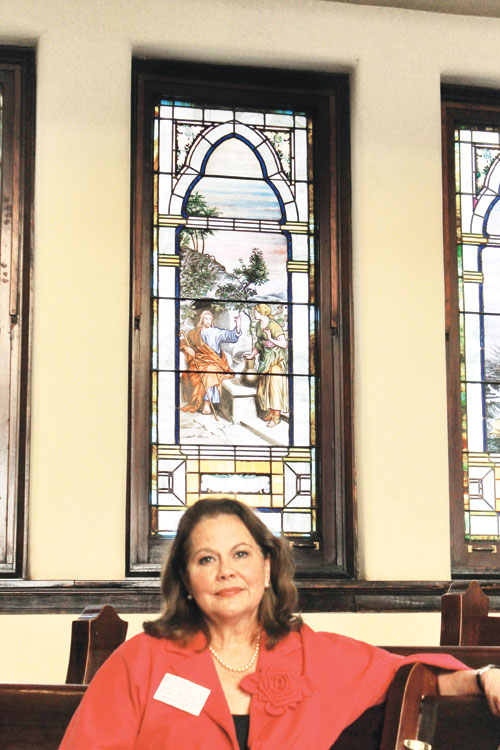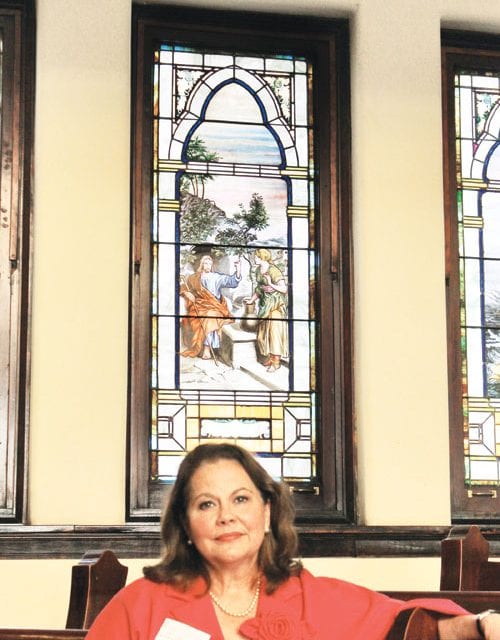By methodically fighting the Religious Right’s battle against the LGBT community, activists have forced the churches to turn to genuine Christian teachings

WELCOME HOME | Oak Lawn United Methodist Church Senior Pastor Anna Hosemann-Butler welcomes the LGBT community and particiapted in Pride last year. (Steve Ramos/Dallas Voice)
About 25 years ago, few people are certain of the date now, the leaders of a church in the middle of the gayborhood made an astonishing decision. The pastor of Oak Lawn United Methodist Church told the congregation it wasn’t appropriate for gay men and women to be in positions of leadership and those who were would be stripped of those roles.
The announcement stunned many of the church members.
“That was a devastating statement,” Shirley Cooper said. “We felt like we had been kicked in the head. Later, the gay people were in the kitchen crying. They had prepared the Thanksgiving dinner for the church, and they, as well as many of us, were wondering what was going to happen next.”
What happened next emptied a good deal of the pews. Cooper and her husband were members of Oak Lawn United Methodist, and they supported their gay son. After that announcement, they spent a year looking for another church, finally choosing Northaven United Methodist Church.
“About 100 people left the church because of that attitude,” Cooper said. “Most of us were very pleased to have gay people in the church, but the top leaders said we should shut the door on gays. They made it seem as if the whole church was in agreement, but that wasn’t the case.”
When the leaders of Oak Lawn United Methodist made that decision, they didn’t know they would strengthen Dallas’ gay activist community. After leaving the church, Cooper and her husband, now deceased, helped establish Dallas’ first PFLAG chapter. By that time, in the early 1990s, Dallas gays and lesbians were solidly entrenched in the fight against AIDS, but they knew they were fighting a multi-front war.
“At that time, the Religious Right was really hammering at us, and they were making huge strides,” Mark Jones said. “They were saying AIDS was God’s way of punishing gays, and we deserved to die, and, unfortunately, a lot of people were buying that message.”
Jones grew up in the small East Texas town of Center in a family whose devotion to the Pentecostal faith was “fanatical.”
“We didn’t have TVs in our homes because it was the devil’s tool,” he said. “Women didn’t wear makeup or pants. As a gay man growing up in that environment, I was one confused boy.”
Having grown up in the far right of the Christian faith, Jones said he sees the tremendous influence the gay rights movement has had on the church.
“When I go home, I can see it’s not the same church,” he said. “Even my family isn’t the same. I hardly hear anything homophobic anymore because public opinion about gays has changed so much. We’ve won so many legal battles, and we’re definitely winning the PR battle. Gay activists have exposed the Religious Right for what it is: Ignorant, mean and hypocritical.”
Yet some experts say that if it hadn’t been for the Religious Right’s attacks on the LGBT community, the activists wouldn’t have fought back so successfully. According to Michael Klarman, who wrote in Harvard Magazine, that as late as 1990 “roughly 75 percent of Americans deemed homosexual sex immoral, 29 percent supported gay adoptions, and only 10 percent to 20 percent backed same-sex marriage. Not a single jurisdiction in the world had yet embraced marriage equality.”
But when U.S. Attorney General Eric Holder recently announced at the Human Rights Campaign’s gala that the federal government will expand the recognition of same-sex marriages in federal legal matters, including bankruptcies, prison visits and survivor benefits, it barely moved the political crisis dial.
Klarman also wrote that in 1999, when Vermont’s high court ruled that the traditional definition of marriage discriminated against same-sex couples, an enormous political controversy erupted. The Vermont Legislature’s 2000 session was dominated by the issue.
In contrast, when a county clerk in New Mexico started issuing marriage licenses to gay men and women last year, Republican Gov. Susana Martinez barely acknowledged it in public. The state moved into the column of other states that allow same-sex marriage without fanfare or the collapse of its society.
“We can thank the activists for that,” Jacob Martin, a Catholic, said. “Back in 1991 when those three gay couples in Hawaii challenged the laws, there was a huge outcry against them. And that was in a state everyone thinks is liberal. Then 20 years later, state after state is doing the opposite and saying the ban against same-sex marriage is unconstitutional. We’ve come a long way, and we have to thank the activists for fighting the religious opposition in this battle.”
Some would say the Religious Right’s attack on gay men and women became public when Anita Bryant’s homophobic campaigns began in the 1970s. Katherine McFarland wrote in a review of the book “How the Religious Right Shaped Lesbian and Gay Activism” that Bryant, using Christian rhetoric and mobilizing church networks, staged campaigns across the country to pass anti-gay legislation or overturn existing protections to LGBT citizens. But gay and lesbian organizations responded to those moves by mobilizing against the campaigns.
“The lesbian and gay movement in New York City could have been intimidated by the anti-gay efforts or ignored them altogether,” book author Tina Fetner wrote. “Rather than choose either of these reactions, a number of social movement organizations decided that Bryant’s activism presented an opportunity to make significant advances in lesbian and gay rights and stepped up their activism significantly … .”
In the past months, the United Methodist Church has been embroiled in controversy as it publicly tried one of its pastors, the Rev. Frank Schaefer, for officiating his son’s marriage. However, the controversy in the Methodist church isn’t new. What is new is that it went public.
“My sense is that the majority of the [Methodist] church backs the activists who are in favor of gay rights, but they have been shut out politically,” said Dr. Robert Hunt, professor of Christian Mission and Interreligious Relations at Southern Methodist University’s Perkins School of Theology. “They’re frustrated that they don’t have a voice, and they are going to turn to other means.”
Hunt said one tool disgruntled Methodists will use is not to submit to the authority of the church, as Schaefer did.
“They’re saying, ‘We’re going to test the will of the church. We’re going to come out in the public forum to see who is with us.’ It’s going to be disruptive, and that’s what activists want. They want to disrupt because that makes people think.”
Methodist ministers who support same-sex marriage are threatening to officiate the weddings and choke the church’s judicial system. Another bishop, Hunt said, has taken an adversarial position against the activists, saying he will suspend all ministers who officiate same-sex weddings, regardless of the financial and emotional strain it will have on the church.
Today, at Oak Lawn United Methodist, Senior Pastor Dr. Anna Hosemann-Butler supervises an LGBT-inclusive church, far removed from the position the church took 20 years ago. The church welcomes LGBT members and participates in Pride. Hosemann-Butler rode on a float in the 2013 parade, and the church opened its doors to the community, offering the use of its facilities.
“Later, as the parade was winding down, I started to clean up our grounds and one of the young women who was sitting on the grass said, ‘Oh, no. We’ll clean up. You don’t have to do that,’” Hosemann-Butler said. “All of us then talked and started picking up things. Then that young woman said, ‘Thank you for not giving up on us.’ That just tore into my heart because it meant someone in the past had given up on her.”
As activists continue to change religion, a question could be raised that asks how will churches incorporate new philosophies into what has been homophobic teachings.
“It’s not so difficult,” Hunt said. “Look at the Baptists and divorce. Until about 1985, most Baptist ministers wouldn’t officiate a second marriage because their interpretation of Scripture was clear on the matter. When we decided that divorced people needed to remarry, they figured out how to make Scripture fit reality. Our interpretation of Scripture can be flexible.”
To Jones, that is obvious. His family now has three television sets when they once didn’t own any. His sisters wear makeup when they once didn’t dare.
“Activism has changed religion for the better, and not just for gays,” he said. “The activists have ripped off the mask of moral authority the churches were used to wearing, and we saw the hate that was beneath it. That was what was driving their fight against us. My parents’ home is such a better place now. Because of the activists, our churches will be a better place, too.”
This article appeared in the Dallas Voice print edition February 21, 2014.











